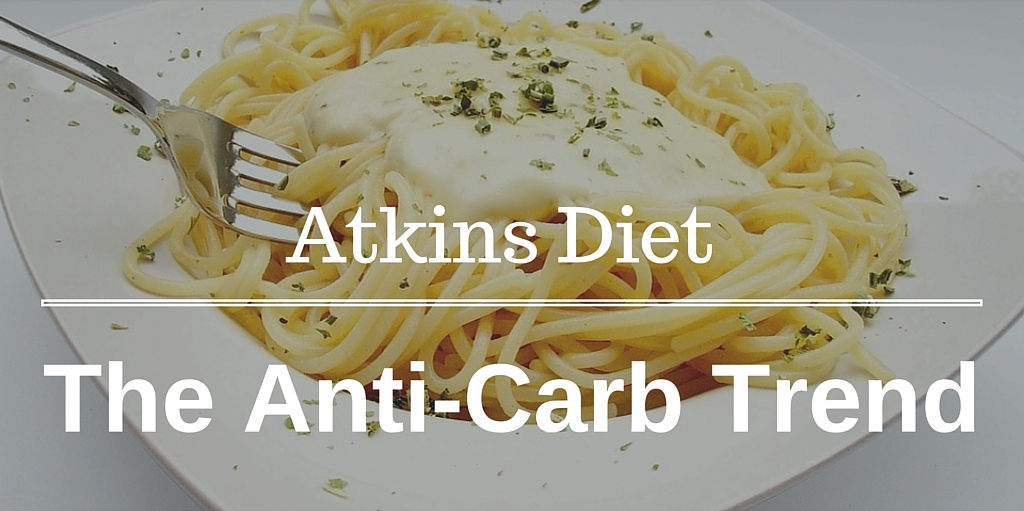Atkins Diet – The Anti Carb Trend

For weight loss purposes ‘The Atkins diet’ (high-protein, high-fat, low-carbohydrate) has been popular for more than a decade now. People now blame carbs instead of fats for the added waistline. But is it really that way?
There have not been many food groups that have caused quite as much controversy as carbohydrates. Some people acknowledge their importance while others insist that they should be excluded completely.
Many people blame an indulgence in carbs when they begin to gain weight. Most believe that the only way to maintain a healthy body weight is to reduce or cut out carbs from your diet.
This article explores the different sides of the arguments to see if either have any merit:
The Effects of a High Carb Diet
It is a lot easier to maintain a high carb diet than it is to settle for a low carb one. It is safe to say that most people take in a lot more carbohydrates than they do other food groups.
For instance, consider the daily snacks that most people indulge in : Fastfoods, packaged cookies, frozen meals, carbonated drinks, etc.
Unless you are sticking to a healthy diet and eating vegetables, fruits and nuts, you are probably consuming carbohydrates. If you do not think that snacks have too large an impact on your diet, you would be wrong.
The number of people that snack more than three times a day has risen sharply, all over the world.
So, the question remains. How does including a large amount of carbohydrates in your diet really affect your health?
Hyperinsulinism
The most distressing side effect of eating too many carbohydrates, is the effect that it has on insulin secretion.
Insulin helps maintain blood glucose levels in the body. It signals the muscle, liver, and fat cells to take in glucose from the blood stream. If your energy levels are depleted, this glucose is used to build them back up again.
If you do not require any additional energy, however, the glucose is converted to glycogen and then stored in the liver.
When you eat carbohydrates, the digestive system causes the digestible carbs to be broken down into sugar. As the level of sugar in the blood rises, the pancreas begins to produce insulin.
Once the glucose in the blood has been absorbed by the cells, the pancreas is signaled to stop producing insulin. However, when the number of carbs consumed are incredibly high, the pancreas simply keeps producing more and more insulin. This results in hyperinsulinism.

The continuation of this process, however, leads to your body developing an insulin resistance which can even cause type II diabetes. This also means that the muscle and liver cells stop responding to the production of insulin.
In addition, the muscle and liver cells have a limited ability to store glucose. Once they have reached this limit, they begin sending the glucose to the fat cells. Here, it begins to accumulate over time. This is one of the reasons that many people are either overweight or obese.
Atkins Diet – The Anti-Carb Trend
Celebrities, personal trainers, and fitness experts will all claim that eating as little carbs (Atkins diet) as possible is the way to lose weight and be healthy.
The acceptance about this attitude has led many to believe that they have to cut out carbohydrates if they want to lose weight. This means sticking to nothing more than 20-50 grams per day.
These individuals also focus on complex carbs as opposed to simple carbohydrates. The items on the forbidden list typically include white rice, white bread, white potatoes, and sometimes pasta. This list can even include certain fruits.
Most people would even claim that this method has been quite successful in helping them shed unwanted pounds. Let us take a look at this method a little more closely:
The idea of cutting out sugar completely certainly seems to support the weight loss hypothesis. Nonetheless, cutting out carbs is not necessarily the answer. For one, when you completely cut out carbohydrates, you are basically cutting off certain foods from your diet depriving your body of many vitamins and minerals.
Also, cutting out carbs means increasing your protein and fat intake to make up for the lost calories. However, this can mean that you are taking in too many saturated fats as you do so. This, in turn, could increase your cholesterol level, resulting in certain types of heart disease.
More importantly, however, is how your body reacts when it is deprived of carbs. Remember, carbs are extremely vital to producing energy for many of the important organs in your body. In particular, it plays a large role in providing fuel for your brain. Thus, it helps greatly with mental functioning and acuity.
Carbs are bad ✘
Fats are bad ✘
Surplus of Fats+Carbs is bad ✓
I do not recommend going low-carb diet for it also limits your food choices and can mess up badly with your strength and hormone levels. For weight loss; I keep my calories in check rather than limiting carbohydrates all the time.
However, I do advocate it for short-term(4-8weeks) for shedding those last few pounds where your overall calorie intake is low. When you take away these carbs, your body has to go looking for the energy elsewhere. This means converting fats into energy.
Side effects of eating low-carb Atkins diet for a prolonged period of time can be dangerous. When fat is broken down, there are ketone bodies that are created in the blood. The greater the amount of fat broken down, the greater the ketone accumulation. This can cause a condition known as ketosis which can be a precursor to diabetic ketoacidosis.
Fiber
Fiber is a type of carbohydrate that the body can’t digest (it passes through the body undigested). Fiber helps you feel full sooner and longer and minimizes the impact of carbs on your blood sugar and insulin level, therefore, making weight management easier.
As you cut carbohydrates off your diet, you also remove fibers from your diet which result in a diminished digestive system and more frequent bouts of constipation. Ofcourse it can be prevented by adding a good Probiotic (Lactobacillus) and Prebiotic (Fiber) supplement to your diet.
Creating a Balance

The verdict is in, carbs are necessary but only a certain type and in a limited amount. If you really want to lose weight, you should not be sticking to a low carb diet as it will not be sustainable in the long run.
Instead, opt for a more balanced approach to eating. A balanced diet essentially means eating the right foods in adequate amounts. You should also eat carbs and fats in lower quantities and keep your calories in check.
- Eat healthier versions of carbs and fats. With carbs, for instance, focus on eating fruits, vegetables, nuts, and wholegrains. As for fats, stick with unsaturated fats, particularly ones that are derived from plants.
- The largest portion of your diet should include protein. Protein is a lot more satisfying and it also curbs sugar cravings. This means eating lean meat and poultry, fish (oily fish in particular), eggs, beans, nuts, and legumes.
The science proves it: neither high carb diets nor low carb diets are conducive for good health or losing weight. The solution is actually a lot simpler and easier to carry out than an all or nothing approach. Thus, what you need to do is eat a balanced diet each day.
If you don’t eat yogurt, or if you are on a low-carb diet do add this Probiotic+Prebiotic supplement to your diet for maintaining good gut health, digestive issues, and to avoid constipation. It also aids in losing weight and in boosting your bodies immunity.
If you want to be healthy and lose weight, eating a balanced diet is not enough. You are also going to have to get enough of exercise each day.
You will find yourself losing weight as well as being able to keep it off. You will also feel a lot healthier and happier.

